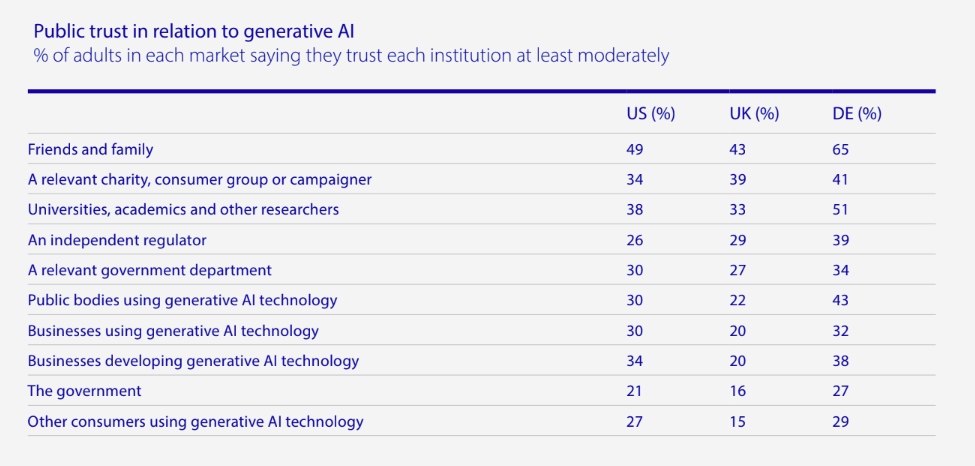Global Counsel’s surveys found public awareness of generative AI to be strikingly high for a novel technology, with around 9 in 10 in the UK, US and Germany claiming to have heard of it. This awareness is largely due to media coverage of dramatic forecasts of its risks, as familiarity was still nascent, with older adults were much less likely to have used the technology (14% of German adults aged 55+ having used ChatGPT compared to 57% of 18-24s). Also there were significant levels of misunderstanding about its functionality and a conflation with other technologies.
Most of the public were yet to form strong views about generative AI and tended to have mixed feelings, recognising both opportunities and risks. The most compelling benefits were its potential to save consumers time, increasing business productivity, and resolving customer service complaints more responsively. The most prominent concerns included increasing unemployment, spreading misinformation and infringing people’s privacy. Across all markets, people who felt more familiar with the technology (esp. younger adults and men) tended to be more favourable than those less familiar, e.g. 41% of US men felt favourable compared to only 27% of US women, reflecting the importance of experience.
Mixed overall attitudes toward generative AI are reflected in views towards different use cases in healthcare, financial services and elsewhere. Attitudes to different use cases were influenced by a number of factors, including the extent of human oversight, how novel the application was perceived to be, and whether or not there was a clear benefit to consumers. For example, the public tended to favour restrictions on generative AI making automatic investment decisions for consumers but were more relaxed about it being used to generate diagnostic reports for doctors to inform patient treatment.
Despite support for oversight and regulation, trust in institutions in relation to generative AI was limited. Trust was generally highest in Germany, while it was lowest in the UK, but broadly suggesting an overall favourability toward generative AI and reflecting a clear link between trust in institutions and trust in the technology. While the UK and German public typically trusted regulators more than businesses developing or using generative AI technology, the reverse was true in the US where businesses were more widely trusted than regulators. Friends and family were among the more trusted sources of information in all three markets, demonstrating how important direct experience and word-of-mouth are likely to be in shaping attitudes to generative AI.

Methodological note:
Global Counsel conducted a research study into attitudes to generative AI and implications for its likely regulation. Alongside interviews with key experts and opinion formers, GC conducted a nationally-representative online survey of the public in the US, UK and Germany (n=1,000 in each nation) and a qualitative Citizens’ Jury with members of the public in the UK. Fieldwork was conducted in July – September 2023.
This article is an excerpt from the Network Readiness Index 2023 main chapter, titled “Trust in a Network Society: A crisis of the digital age?”. Download the NRI and read the full chapter at networkreadinessindex.org/
Global Counsel is a strategic advisory firm with offices in Brussels, Doha, London, Singapore, and Washington DC, providing a wide range of services and capabilities for corporates and investors. They help clients anticipate regulatory and political change, provide due diligence support, and build compelling, evidence-based campaigns to engage in policy debates.



